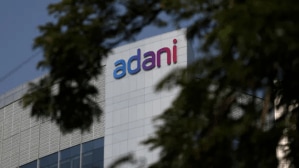Opening Vizhinjam port, PM Modi’s swipe at Opposition: ‘This will give sleepless nights to many’
In presence of industrialist Gautam Adani, PM underscores that even the Left is having to embrace private sector
 Prime Minister Narendra Modi addresses at the inauguration of Vizhinjam International Deepwater Multipurpose Seaport, in Thiruvananthapuram. (Photo: ANI)
Prime Minister Narendra Modi addresses at the inauguration of Vizhinjam International Deepwater Multipurpose Seaport, in Thiruvananthapuram. (Photo: ANI)Dedicating the Vizhinjam port in Left-ruled Kerala to the country, Prime Minister Narendra Modi Friday took a dig at the CPI(M) for its longstanding opposition to private investment.
Praising the Adani group for completing the construction in a short span, Modi said in the presence of industrialist Gautam Adani, “I have returned from visiting the port. When the people of Gujarat come to know that Adani has built such a good port here in Kerala — he has been working on ports in Gujarat for 30 years, but he has not built such a port there yet — he will have to be ready to face their anger. I would also like to say to our Chief Minister (Pinarayi Vijayan) — you are a strong pillar of the INDI Alliance. (Congress MP) Shashi Tharoor is also sitting here, and today’s event will give many people sleepless nights.”
The Rs 8,800-crore Vizhinjam International Deepwater Multipurpose Seaport is being developed by Adani Ports and SEZ Limited on a design, build, finance, operate and transfer (DBFOT) model. In 2015, when the then Congress regime inked the deal with the Adani group, the CPI(M), then in the Opposition, had dubbed it a land scam of Rs 6,000 crore. However, at the inaugural venue, CPI(M) leader and state Port Minister V N Vasavan referred to the industrialist as “our partner Adani”.
Referring to the state minister’s reference to Adani, the Prime Minister said, “When our Port Minister was delivering his speech, he said that Adani is our government’s partner. A minister of a Communist government is saying this for the private sector — this is changing India.’’
At one point, as the translator bungled Modi’s reference to INDI Alliance as “Indian airlines”, the Prime Minister said, “The translator could not (translate these lines)… but the message has gone where it had to.”
In response to the PM’s remarks, AICC general secretary (organisation) K C Venugopal said that “even after the horrific terrorist attack in Pahalgam, our PM remains fixated on disturbing the sleep of Opposition leaders instead of confronting the real threat — Pakistan”.
“But rest assured, PM, while you’re busy with your distractions, our sleepless nights will be spent holding you accountable. We will relentlessly pressure you to set a timeline for the caste census, remove the 50% cap on reservation, and finally deliver the strong, decisive response that Pakistan so rightly deserves,” he said.
Underscoring the role of the private sector in elevating India’s maritime industry to new heights, Modi said that under public-private partnerships, thousands of crores have been invested over the past 10 years. This collaboration has not only upgraded India’s ports to global standards but also made them future-ready, he said.
The Prime Minister also used the event to strike a chord with the state’s Christian community, particularly the Catholic segment that lives along the coastal belt. He paid tribute to Pope Francis, who died last week, saying that the world will remember his contributions. He also shared his personal experiences with the Pope, expressing his gratitude for having had multiple opportunities to meet him.
The Rs 8,900-crore port, India’s first deepwater transshipment hub, is a “symbol of new-age development”, Modi said.
Just 10 nautical miles from a prominent East-West international shipping route, the port can accommodate next-generation ultra-large container ships. With India’s tallest ship-to-shore cranes and AI-based vessel traffic management systems, it is geared for all-weather, 24/7, fully automated operations.
“The nation had to bear revenue losses because it was dependent on foreign ports for transshipment. This port will change that. The country’s money will now be utilised for its own development. The money that had been going abroad earlier will now create new economic opportunities for the people of Kerala and Vizhinjam,” Modi said.
The port is likely to reduce India’s dependence on overseas transshipment hubs such as Colombo, Dubai and Singapore, which account for 75% of India’s transshipment cargo.
Chief Minister Vijayan called the port’s commissioning “Kerala’s dream come true” and credited the state’s determination for reviving a project that faced decades of uncertainty. Originally envisioned in 1991, the port faced failed bids, natural calamities, material shortages, and public protests before Adani Ports was awarded the project in 2015.
The state government spent Rs 5,370 crore on the project, with APSEZ paying Rs 2,497 crore and the Centre giving Rs 818 crore as viability gap funding. Though scheduled to be completed in 2045, the project started operating in 2024, and all the phases are now targeted to be finished by 2028.
Modi emphasised that the port is just one component of a larger vision. “Infrastructure development alone can bring economic development. We are integrating highways, railways, airways and waterways under a blueprint for industrial growth,” he said.







